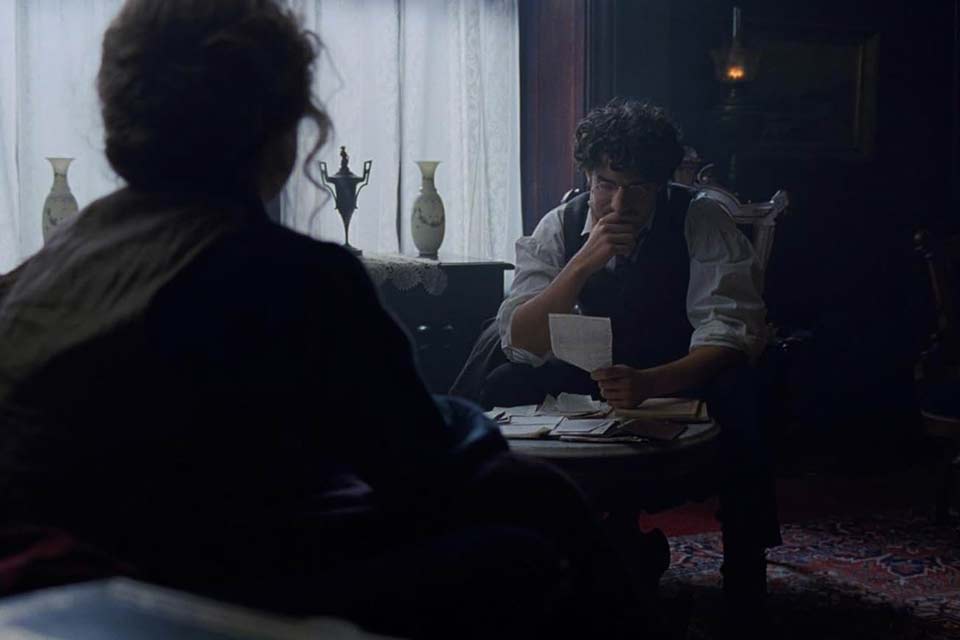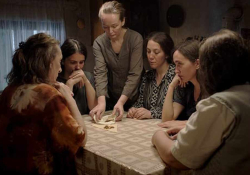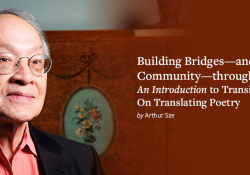Criticism Is Literature. Why Is It Vanishing?

What do the best book reviews do? What is the current state of the critical ecosystem? Chicago Review of Books founder Adam Morgan takes stock of book reviewing in the US.
My favorite scene in Greta Gerwig’s adaptation of Little Women is when the professor, Friedrich Bhaer, reads a few short stories by the budding novelist, Jo March.
“Honestly, I don’t like them,” Friedrich says. “I think that they’re not good.”
Jo is stunned. “And who made you high priest of what’s good and what’s bad?” she replies, before going for Friedrich’s throat. “You will always be a critic, and never an author—and the world will forget that you ever even lived.”
Literary people always laugh at this line because it feels true. In the public imagination, authors are gods. They forge new universes where before there was only darkness. Critics, on the other hand, are embittered antagonists, like Lucifer cursing the sky in Paradise Lost: “O sun, to tell thee how I hate thy beams.”
In reality, this dichotomy between authors and critics is false. A great book review can be just as rich, entertaining, and insightful as a great short story. Criticism is literature—a mercurial species of creative nonfiction that fills the shape of its container. Trade publications like Publishers Weekly, Kirkus Reviews, and Booklist publish “capsule” reviews of just 200–300 words, usually a few months before a book’s pub date. Newspapers like the Boston Globe and magazines like Slate publish 800- to 1,200-word reviews when a book hits bookstores. Specialist magazines like Bookforum, World Literature Today, and the New York Review of Books, as well as scholarly journals like Critical Inquiry, publish reviews and “critical essays” as long as they want, whenever they want.
A great book review can be just as rich, entertaining, and insightful as a great short story.
Yet over the last twenty years, many general-interest publications have stopped printing book reviews altogether, leaving critics with fewer opportunities to hone their craft while getting paid. New digital outlets are filling in the gaps—and in many cases reviewing a wider variety of books—but most are underfunded compared to their legacy-media ancestors.
But what makes a good review good? Who’s writing them these days? And why have so many publications stopped printing them? I spoke with more than two dozen freelance and full-time book critics to find out.
* * *
In the late 2000s, I started reviewing books as a twenty-three-year-old MFA student because it seemed like the fastest way to get published. I had just moved to Chicago, where Cheryl Reed was the new books editor at the Chicago Sun-Times. Jennifer Day would soon hold the same role at the Chicago Tribune, Christine Newman was the literary editor at Chicago magazine, and the Chicago Reader regularly published reviews of books by local authors.
I didn’t know how to contact any of those people, but when Jessa Crispin—the founder of a “webzine” called Bookslut—came to speak with my graduate school, I introduced myself and asked if I could write for her “blog.” She said yes. The pay? $0. I was delighted. (Today, none of these publications have a books editor or a dedicated book review section in the print edition. Bookslut shut down in 2016. I covered books for Chicago magazine as a freelancer in the 2010s, until an editor asked me for pitches, passed on them, then covered one of the books I brought to his attention because he “really wanted to write it” himself. Around the same time, a now-former CEO of the Chicago Sun-Times asked me to run its book coverage. The pay? $0. I was offended.)
Back in the ’00s, a few days after I met Crispin, I realized there was a problem: I had no idea how to write a book review. At Barnes & Noble, I looked for craft books on writing literary criticism. There weren’t any. “I’m not convinced that how-to-write-a-novel books really help people learn how to write novels—so I don’t feel critics are at a disadvantage in this regard,” says Becca Rothfeld, a staff critic at the Washington Post. “I learned how to write reviews the same way I learned how to write essays, and the same way that I imagine most novelists worth their salt learn to write novels: I spent most of my life reading.”\
Lionel Trilling and Pauline Kael were bigger stars in my family of origin than Harrison Ford and Carrie Fisher.—Alexandra Jacobs
Alexandra Jacobs, a staff critic at the New York Times, had a similar experience. “[The critics] Lionel Trilling and Pauline Kael were bigger stars in my family of origin than Harrison Ford and Carrie Fisher,” she says. “My father had a beautiful habit of cutting out the reviews of Anatole Broyard or Christopher Lehmann-Haupt from the paper and putting them inside the books he bought. Those yellowing clips will fall out when I pull down some old volume for reference, and it’s like he’s speaking to me from the great beyond.”
Unlike those critics, I had grown up reading Roger Ebert’s movie reviews, not book reviews. Fortunately, I kept searching for craft advice until I struck gold: John Updike’s six rules for literary criticism from the introduction to his 1975 essay collection, Picked-Up Pieces.
1. Try to understand what the author wished to do, and do not blame him for not achieving what he did not attempt.
2. Give him enough direct quotation—at least one extended passage—of the book’s prose so the review’s reader can form his own impression, can get his own taste.
3. Confirm your description of the book with quotation from the book, if only phrase-long, rather than proceeding by fuzzy précis.
4. Go easy on plot summary, and do not give away the ending. (How astounded and indignant was I, when innocent, to find reviewers blabbing, and with the sublime inaccuracy of drunken lords reporting on a peasants’ revolt, all the turns of my suspenseful and surpriseful narrative! Most ironically, the only readers who approach a book as the author intends, unpolluted by pre-knowledge of the plot, are the detested reviewers themselves. And then, years later, the blessed fool who picks the volume at random from a library shelf.)
5. If the book is judged deficient, cite a successful example along the same lines, from the author’s oeuvre or elsewhere. Try to understand the failure. Sure it’s his and not yours?
To these concrete five might be added a vaguer sixth, having to do with maintaining a chemical purity in the reaction between product and appraiser. Do not accept for review a book you are predisposed to dislike, or committed by friendship to like. Do not imagine yourself a caretaker of any tradition, an enforcer of any party standards, a warrior in an ideological battle, a corrections officer of any kind. Never, never [try] to put the author “in his place,” making him a pawn in a contest with other reviewers. Review the book, not the reputation. Submit to whatever spell, weak or strong, is being cast. Better to praise and share than blame and ban. The communion between reviewer and his public is based upon the presumption of certain possible joys in reading, and all our discriminations should curve toward that end.
Jo March would be thrilled to learn that Updike is remembered for his novels, not his book reviews. Nonetheless, Updike’s rules for criticism helped me figure out which books to review, how to quote from them, and how to talk about them fairly. Still, I faced every critic’s two highest hurdles: how to begin a review, and how to end one.
* * *
Many book critics agonize over their first few sentences. Sometimes, all it takes is a few minutes of inspiration—other times, a few weeks of anxiety. (I couldn’t write a single word of this story until I knew how it started.)
“I probably spend a third of my time on the opening,” says Ron Charles, a staff critic at the Washington Post since 2005. “My readers are incredibly busy. They’re trying to make breakfast. If I don’t hook them with those first three paragraphs, it’s over. No one is going to trudge through your review like your mom might. It’s got to be interesting, engaging, funny, crucial, and exciting.”
Parul Sehgal, who has worked as a staff critic at the New York Times and the New Yorker, is perhaps our finest crafter of opening lines. Her reviews often begin like a magazine feature, with a clear and irresistible hook:
—In the spring of 1995, dozens of snakes appeared on the beaches of Southern California.
—The curtain rises on a dim, drab room.
—In recent years, headless animals have turned up with disconcerting frequency in New York City parks—goats mainly, but also chickens, and on occasion, a pig or calf.
For some critics, ending a review is even harder. “I love beginnings, but as my long-suffering editor can attest, it will sometimes take me a few tries to finish,” says Jacobs.
Charles struggles with endings sometimes, too. “I kind of throw in the towel on the first draft and then come back later,” he says. “I’m much more likely to use a quotation at the end, something that captures what I’m trying to say or is in some kind of ironic opposition to what I’ve said. Sometimes I radically redo the end at the last minute, and I would never do that to the beginning of the review!”
In 2016, inspired by Margaret C. Anderson’s The Little Review and the Los Angeles Review of Books, I founded the Chicago Review of Books, an online literary magazine. When putting together guidelines for our critics, I included Updike’s six rules and added four of my own, based on feedback I’d been given by editors.
7. Convey what’s newsworthy about the book. Establish this early. Why should people care about it?
8. Talk about the story beyond the basic premise. Don’t simply repeat the set-up from the back cover or publicity descriptions. Dig into the story a little further and don’t be afraid to talk about things that happen in the first 50–75% of the book (while avoiding true spoilers).
9. Convey what the book is like more than whether it’s good or bad. If you were interested in a new ice cream flavor, what would you want to know? Whether a stranger thought it was good or bad, or an evocative description of what it tastes like? Your appraisal is secondary.
10. Be specific and concrete. Praise like “well-written,” “well-researched,” “page-turner,” and other clichéd terms don’t really tell us much. Convey the book’s style, structure, and tone as specifically as you can. Comparisons to something the reader already knows can be quite effective (e.g., “Alien is like Jaws in space”).
“There are as many ways to be a good critic as there are to be a good novelist or poet,” says Rothfeld. “The best critics have distinctive styles and sensibilities, and the best critics are also consistently surprising. It can be hard to balance the two imperatives: we read James Wood because he’s James Wood, with his distinctive preoccupations and predilections, but we also read James Wood because we never know quite what he’s going to say.”
* * *
While Jo March makes a distinction between authors and critics, in 2025 they are often the same person. Just glance at the New York Times Book Review and you’ll see that nearly all of their contributing critics have written books themselves. In fact, as far as I can tell, there are only seven full-time book critics left in the United States: three at the New York Times (Alexandra Jacobs, Dwight Garner, and Jennifer Szalai), two at the Washington Post (Becca Rothfeld and Ron Charles), and one each at the Wall Street Journal (Sam Sacks), New York magazine (Andrea Long Chu), and Slate (Laura Miller, though she occasionally covers TV).
“There are more people who have walked on the moon than write book reviews for a living,” says Charles. The rest of us are freelancers—and according to the Freelance Solidarity Project, nearly one-third of freelance book critics make less than the federal minimum wage for their reviews. Some publications can’t afford to pay at all, nonprofits usually offer an honorarium between $25 and $100, a few newspapers still pay between $250 and $600 for a review, and rates for the Manhattan Triumvirate (the New York Times, New Yorker, and New York Review of Books) might as well be protected by NDAs.
“One of the hardest parts of reviewing as a freelancer is having to read a substantial amount of a book before pitching it,” says Michelle Hart, a freelance critic and the former assistant books editor at O, The Oprah Magazine. “Who honestly has the time and financial freedom to do that? A lot of freelancers either have to lie and say they liked a thing when they haven’t read much of it, or they have to pitch books by authors that already have a ton of buzz.”
Another pain point for freelancers? Venues that pay for book reviews keep disappearing. “In my hometown of Chicago, both of the major papers don’t really cover books at all, and the publications that do don’t offer a ton of money,” says J. Howard Rosier, a freelance critic and board member at the National Book Critics Circle. “Doing this professionally, without being subsidized by teaching or holding a full-time job, is a really tall order.”
* * *
In the United States, literary criticism has been embedded in newspapers since James Franklin founded the New-England Courant in 1721; his brother, Benjamin Franklin, would mock and parody other writers in pseudonymous “Silence Dogood” columns. In the 1830s, Edgar Allan Poe became known as “the Tomahawk Man” for his scathing reviews in the Southern Literary Messenger and other magazines long before he was widely appreciated for his fiction or poetry.
Why, then, have so many newspapers and magazines slashed or shuttered their book review sections over the last twenty years? The first domino was likely the transition from print to digital. As online publishing began to mature, performance metrics became available for individual articles—and the numbers weren’t good for book reviews.
“You get far more traffic with a list format, an essay pegged to a book release, or an author interview than a straightforward review,” says Lincoln Michel, editor in chief of Electric Literature between 2014 and 2017. “When traffic is driven by search and social media, you will simply have more people click on a headline like ‘The 10 Best Haunted House Novels’ than a review of an individual haunted house novel that they likely haven’t heard of.”
The same was true at the Chicago Review of Books when I was editor in chief between 2016 and 2019: even at a publication with the word “review” in its name, book reviews were our least popular articles. Lists, interviews, and features earned more search traffic, more clicks on social media, and more links from other websites.
“When I was at O, The Oprah Magazine, we were one of the only glossies left that published ‘straight’ reviews at all—‘straight’ here meaning reviews of books in and of themselves, not putting a book into a larger cultural context, not trend pieces,” says Hart. “But I don’t think even that magazine publishes reviews anymore. I don’t even know if my job exists anymore—there or anywhere else.”
For many book review sections, the real nail in the coffin was when private equity firms and hedge funds started buying newspapers and magazines and running them like Silicon Valley startups. (Between 2002 and 2019, the number of newspapers owned by private equity funds increased from 5 percent to 23 percent, according to the National Bureau of Economic Research.) When the vulture capitalists started slashing newsrooms to maximize shareholder value, they looked at all kinds of performance metrics. Guess which sections were the first to go?

For many book review sections, the real nail in the coffin was when private equity firms and hedge funds started buying newspapers and magazines and running them like Silicon Valley startups.
* * *
Fewer venues. Lower pay. Seven full-time jobs. Absolutely brutal jokes in Academy Award–winning movies. Given the reality of literary criticism in 2025, why does it seem like there are more (good) book critics than ever?
For some, reviewing books is an act of community service. “Sometimes I write reviews because they act as proof that someone spent time with a text,” says Summer Farah, a freelance critic and poet. “I can’t help but think, ‘If I don’t write about this, will anyone?’”
Rosier agrees. “Thinking seriously about literature has provided me with a sense of community, which has in turn provided reciprocal support and enthusiasm for my own projects,” he says.
For other critics, it’s an intellectual pursuit. “Reviewing books forces you to grapple with a relatively large, complicated mass of ideas and figure out what you think about it all,” says Chelsea Leu, a freelance critic and former reviews editor at The Rumpus. “Watching smart critics do this on the page makes everyone a little smarter, or maybe better thinkers.”
There is one thing more book publishers could do to help the world remember that book critics even lived: properly attributing our words when they quote us. Book reviews have been excerpted on the front covers, back covers, and interiors of millions of books, but 90 percent of the time you’d never know who wrote it; the quote is usually just credited to the review publication.
“When I see Dwight [Garner]’s name, but my name was just ripped off and all they’ve got is ‘The Washington Post,’ it hurts me,” jokes Ron Charles. “But I think the number of people who can recognize a book critic’s name is in the hundreds.” Still, imagine how book publishers would react to the inverse: a critic reviewing one of their authors and only attributing “Riverhead Books” or “Penguin Press.”

All the critics I spoke with approach criticism with the same sense of curiosity, rigor, and adventure as a novelist, journalist, or poet.
There is no secret formula for writing a brilliant book review, but all the critics I spoke with approach criticism with the same sense of curiosity, rigor, and adventure as a novelist, journalist, or poet. The best reviews introduce you to new ideas, make you laugh, and surprise you. Even now, a critic’s greatest challenge may not be finding a venue that pays but rather cultivating their own, unique voice that stands out from the crowd.
“What’s the difference between a well-written review and a fantastic review?” I ask Alexandra Jacobs.
“Courage,” she says.
Mebane, North Carolina










